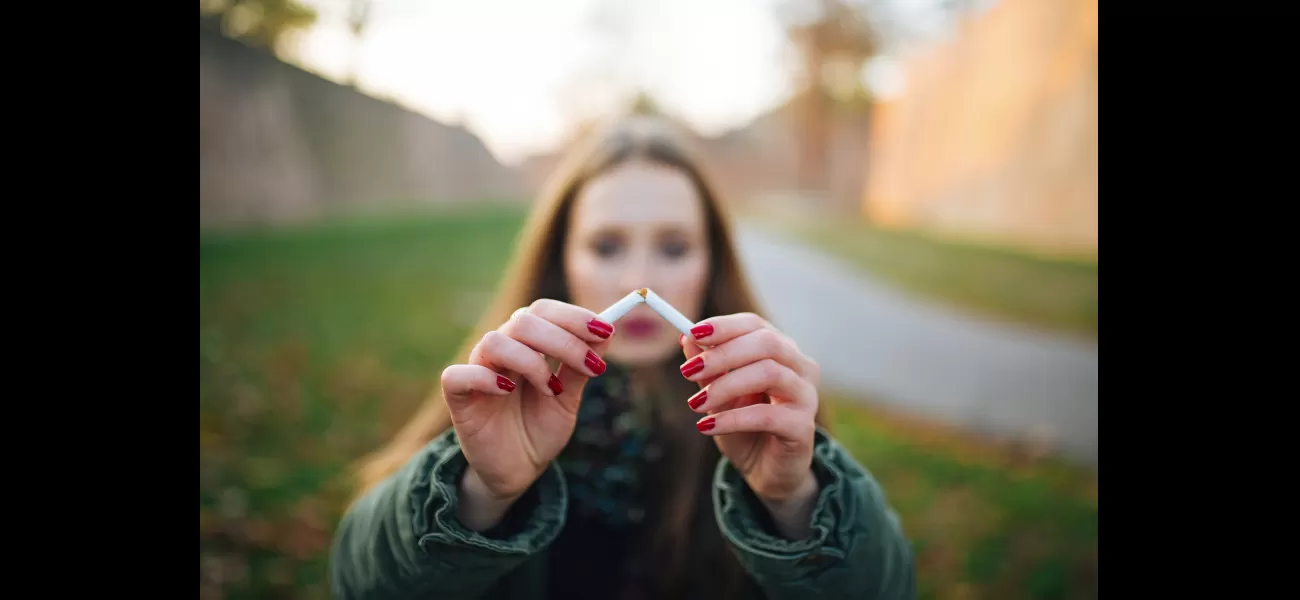Possible paraphrase: Selling tobacco to anyone under 15 may become illegal this year - here's why.
Thousands of Brits struggle to quit smoking every year, putting themselves at risk for serious illnesses and premature death.
February 15th 2024.

The government's plan to prevent the sale of tobacco to children under the age of 15 is a groundbreaking public health measure that has the potential to save thousands of lives. It's a simple concept, really: the best way to stop smoking is to never start in the first place. While taking that first puff may seem harmless, the reality is that quitting later on can be incredibly challenging.
Every year, countless individuals in the UK attempt to quit smoking, but many are unsuccessful. This not only puts them at risk for serious illnesses like strokes, diabetes, and heart disease, but it also cuts their life expectancy by a full decade. In fact, tobacco is responsible for a staggering 80,000 deaths each year in the UK, amounting to nearly 220 deaths every day. It's clear that smoking is a highly addictive habit that can have devastating consequences.
That's why the government's latest announcement is so significant. They have set out to create our first-ever smokefree generation, which will include anyone born on or after January 1, 2009. This means that those who turn 15 this year or younger will never legally be able to purchase tobacco products, effectively phasing out smoking over time. The goal? To tackle the leading preventable cause of illness, disability, and death in the UK.
According to Chief Medical Officer Professor Chris Whitty, smoking is an addiction that most people regret ever starting. And while they may try to quit, the reality is that the choice has been taken away from them. As a doctor, he has witnessed firsthand the struggles that smokers face when trying to quit.
The new legislation proposed by the government will not only prevent future generations from taking up smoking but will also gradually eliminate the sale of tobacco products. This will not criminalize smoking for those who currently purchase tobacco legally, but it will save thousands of lives and billions of pounds for the NHS and the economy each year.
In addition to cracking down on rogue retailers, the government will also provide funding to combat the sale of illicit tobacco and vapes to underage individuals. They will also double the funding for local stop smoking services, with the aim of helping more people quit.
The bill also addresses the issue of youth vaping, which has seen a threefold increase in the past three years. One in five children have admitted to trying vaping in just two months last year, highlighting the need for action to protect their developing lungs and brains from the potential long-term effects of these products.
For many, the decision to quit smoking is a personal one. Stella Coombe, a 59-year-old from Saltburn-by-the-Sea, North Yorkshire, quit smoking after witnessing a friend struggle and eventually pass away from chronic obstructive pulmonary disease (COPD). She used the NHS Quit Smoking app, which not only tracked her lung health but also showed her how much money she was saving by quitting.
Amie Roulland, a 45-year-old from southeast London, quit smoking to set a good example for her children. She didn't want them to follow in her footsteps and develop the same harmful habit that her parents had. Since quitting, she has noticed an increase in her energy levels, making everyday tasks like rushing for the train and playing with her kids much easier.
Others are motivated to quit by the desire to improve their overall health and achieve personal goals. One person shared how they quit smoking in order to climb Mount Kilimanjaro in 2025 with a group of friends. The combination of health concerns, financial reasons, and personal aspirations can all serve as powerful motivators to kick the smoking habit.
In conclusion, the government's plan to prevent the sale of tobacco to children under 15 is a crucial step towards creating a healthier, smokefree generation. By eliminating the option to start smoking at a young age, we can potentially save thousands of lives and improve the overall health of our nation. Whether it's for personal reasons or the greater good, quitting smoking is a decision that can have a profound impact on one's life. So let's strive towards a future where our children never have to face the struggles of quitting, and instead, they can live long and healthy lives, free from the grip of nicotine addiction.
The government has recently announced plans to introduce a new law that could have a significant impact on public health. It may soon be illegal to sell tobacco to anyone under the age of 15. This is a step towards preventing young people from ever starting to smoke, as it is much easier to never start than to try and quit later on.
Unfortunately, many people struggle to quit smoking, even though they may desperately want to. This leads to serious health problems such as strokes, diabetes, and heart disease, and can even result in an early death. In the UK alone, tobacco kills an astonishing 80,000 people each year, cutting their lives short by a decade. It is clear that smoking is highly addictive and many smokers wish they had never started.
That's why the government's new measure is so important. It will make it an offence to sell tobacco products to anyone born on or after January 1, 2009. This means that anyone turning 15 this year or younger will never be legally sold tobacco, creating our first-ever smokefree generation. The goal is to eventually phase out smoking entirely, in order to tackle the leading cause of preventable illness and death in the UK.
According to Chief Medical Officer Professor Chris Whitty, smoking is based on addiction and many people regret ever starting. Despite their efforts to quit, they cannot overcome their addiction. The new law will help to protect our children from this harmful habit.
The Prime Minister has also announced plans to introduce a smokefree generation by making it illegal to sell tobacco to anyone born on or after January 1, 2009. This will prevent future generations from ever taking up smoking. It is important to note that this will not criminalize smoking, and current legal smokers will still be able to purchase tobacco. However, over time, tobacco sales will be phased out, saving lives and benefiting the economy.
In addition to the new legislation, the government plans to crack down on the illicit tobacco trade and the sale of tobacco and vapes to underage individuals. They will also increase funding for stop smoking services to help more people quit.
This new bill also addresses the growing issue of youth vaping, as the number of young people using these devices has tripled in the past three years. By reducing their appeal and availability to children, the government hopes to protect their developing lungs and brains from the unknown long-term effects of vaping and nicotine addiction.
Many individuals have shared their own personal reasons for quitting smoking, such as seeing a friend suffer from COPD or wanting to set a good example for their children. The government's actions will not only benefit public health, but also support individuals in their decision to lead a smokefree life.
Every year, countless individuals in the UK attempt to quit smoking, but many are unsuccessful. This not only puts them at risk for serious illnesses like strokes, diabetes, and heart disease, but it also cuts their life expectancy by a full decade. In fact, tobacco is responsible for a staggering 80,000 deaths each year in the UK, amounting to nearly 220 deaths every day. It's clear that smoking is a highly addictive habit that can have devastating consequences.
That's why the government's latest announcement is so significant. They have set out to create our first-ever smokefree generation, which will include anyone born on or after January 1, 2009. This means that those who turn 15 this year or younger will never legally be able to purchase tobacco products, effectively phasing out smoking over time. The goal? To tackle the leading preventable cause of illness, disability, and death in the UK.
According to Chief Medical Officer Professor Chris Whitty, smoking is an addiction that most people regret ever starting. And while they may try to quit, the reality is that the choice has been taken away from them. As a doctor, he has witnessed firsthand the struggles that smokers face when trying to quit.
The new legislation proposed by the government will not only prevent future generations from taking up smoking but will also gradually eliminate the sale of tobacco products. This will not criminalize smoking for those who currently purchase tobacco legally, but it will save thousands of lives and billions of pounds for the NHS and the economy each year.
In addition to cracking down on rogue retailers, the government will also provide funding to combat the sale of illicit tobacco and vapes to underage individuals. They will also double the funding for local stop smoking services, with the aim of helping more people quit.
The bill also addresses the issue of youth vaping, which has seen a threefold increase in the past three years. One in five children have admitted to trying vaping in just two months last year, highlighting the need for action to protect their developing lungs and brains from the potential long-term effects of these products.
For many, the decision to quit smoking is a personal one. Stella Coombe, a 59-year-old from Saltburn-by-the-Sea, North Yorkshire, quit smoking after witnessing a friend struggle and eventually pass away from chronic obstructive pulmonary disease (COPD). She used the NHS Quit Smoking app, which not only tracked her lung health but also showed her how much money she was saving by quitting.
Amie Roulland, a 45-year-old from southeast London, quit smoking to set a good example for her children. She didn't want them to follow in her footsteps and develop the same harmful habit that her parents had. Since quitting, she has noticed an increase in her energy levels, making everyday tasks like rushing for the train and playing with her kids much easier.
Others are motivated to quit by the desire to improve their overall health and achieve personal goals. One person shared how they quit smoking in order to climb Mount Kilimanjaro in 2025 with a group of friends. The combination of health concerns, financial reasons, and personal aspirations can all serve as powerful motivators to kick the smoking habit.
In conclusion, the government's plan to prevent the sale of tobacco to children under 15 is a crucial step towards creating a healthier, smokefree generation. By eliminating the option to start smoking at a young age, we can potentially save thousands of lives and improve the overall health of our nation. Whether it's for personal reasons or the greater good, quitting smoking is a decision that can have a profound impact on one's life. So let's strive towards a future where our children never have to face the struggles of quitting, and instead, they can live long and healthy lives, free from the grip of nicotine addiction.
The government has recently announced plans to introduce a new law that could have a significant impact on public health. It may soon be illegal to sell tobacco to anyone under the age of 15. This is a step towards preventing young people from ever starting to smoke, as it is much easier to never start than to try and quit later on.
Unfortunately, many people struggle to quit smoking, even though they may desperately want to. This leads to serious health problems such as strokes, diabetes, and heart disease, and can even result in an early death. In the UK alone, tobacco kills an astonishing 80,000 people each year, cutting their lives short by a decade. It is clear that smoking is highly addictive and many smokers wish they had never started.
That's why the government's new measure is so important. It will make it an offence to sell tobacco products to anyone born on or after January 1, 2009. This means that anyone turning 15 this year or younger will never be legally sold tobacco, creating our first-ever smokefree generation. The goal is to eventually phase out smoking entirely, in order to tackle the leading cause of preventable illness and death in the UK.
According to Chief Medical Officer Professor Chris Whitty, smoking is based on addiction and many people regret ever starting. Despite their efforts to quit, they cannot overcome their addiction. The new law will help to protect our children from this harmful habit.
The Prime Minister has also announced plans to introduce a smokefree generation by making it illegal to sell tobacco to anyone born on or after January 1, 2009. This will prevent future generations from ever taking up smoking. It is important to note that this will not criminalize smoking, and current legal smokers will still be able to purchase tobacco. However, over time, tobacco sales will be phased out, saving lives and benefiting the economy.
In addition to the new legislation, the government plans to crack down on the illicit tobacco trade and the sale of tobacco and vapes to underage individuals. They will also increase funding for stop smoking services to help more people quit.
This new bill also addresses the growing issue of youth vaping, as the number of young people using these devices has tripled in the past three years. By reducing their appeal and availability to children, the government hopes to protect their developing lungs and brains from the unknown long-term effects of vaping and nicotine addiction.
Many individuals have shared their own personal reasons for quitting smoking, such as seeing a friend suffer from COPD or wanting to set a good example for their children. The government's actions will not only benefit public health, but also support individuals in their decision to lead a smokefree life.
[This article has been trending online recently and has been generated with AI. Your feed is customized.]
[Generative AI is experimental.]
0
0
Submit Comment





